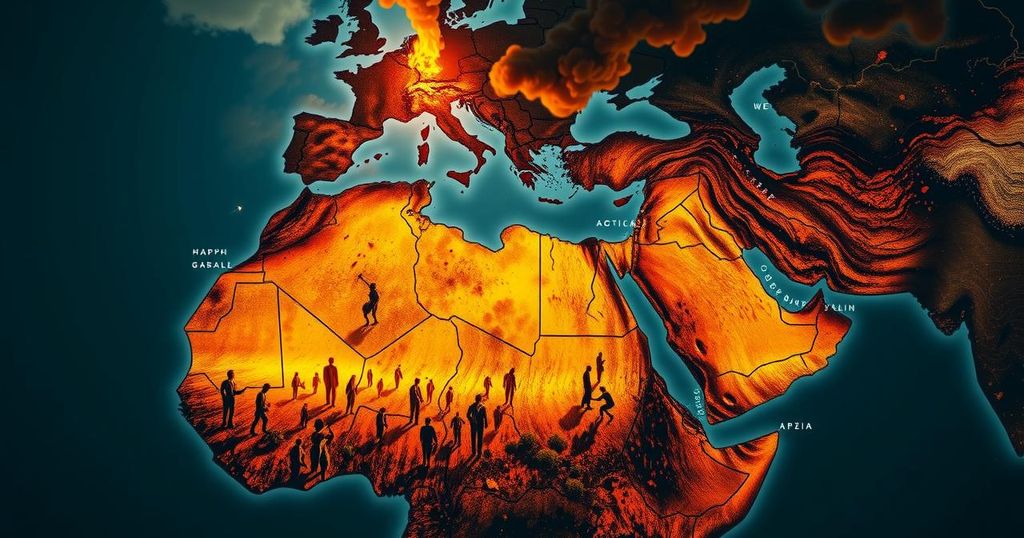Rising Tensions in the Horn of Africa: A Shift Towards Collective Security Against Ethiopia

Rising tensions in the Horn of Africa are marked by Egypt, Somalia, and Eritrea discussing a collective security alliance against Ethiopia due to several regional conflicts, including Ethiopia’s controversial agreement with Somaliland. This alliance could exacerbate existing hostilities and escalate into proxy conflicts, similar to the Cold War. The ongoing instability prompts concern over the humanitarian situation and the potential for significant geopolitical changes in the region.
Tensions are escalating once again in the Horn of Africa as Egypt, Somalia, and Eritrea engage in discussions regarding the establishment of a collective security alliance targeted at Ethiopia. The meeting, held on 10 October 2024 in Asmara, Eritrea’s capital, signified a shift in diplomatic alignments, with leaders from these countries exploring options that could lead to unified military cooperation or potential economic sanctions against Ethiopia. This development raises alarm over the stability of a region already marred by civil unrest and conflict. Since August 2024, Egypt has initiated military coordination with Somalia, and a similar security partnership with Eritrea is anticipated. The convergence of Eritrean President Isaias Afwerki, Egyptian President Abdel Fattah al-Sisi, and Somali President Hassan Sheikh Mohamud marks a significant diplomatic milestone that could reshape geopolitical dynamics in the Horn of Africa. This region has recently attracted international attention due to the ongoing civil war in Ethiopia, which has resulted in enormous casualties and created a dire humanitarian crisis. The tensions surrounding the forthcoming alliance have been exacerbated by Ethiopia’s controversial agreement with Somaliland, a self-declared independent region within Somalia. This arrangement allows Ethiopia to gain maritime access to the Red Sea via the Berbera port and recognizes Somaliland’s sovereignty for the first time by a significant regional power. Such developments have led to heightened discontent from the Somali government and neighboring countries, such as Egypt and Eritrea, both of whom perceive this agreement as a violation of Somalia’s territorial integrity. Egypt’s longstanding issues with Ethiopia particularly involve the Grand Ethiopian Renaissance Dam, which Cairo views as a direct threat to its water security. The potential establishment of an Ethiopian naval presence is thus a cause for concern for Eritrea, which has historically been at odds with Ethiopia. As Ethiopia navigates these developments, Somalia is grappling with internal instability as al-Shabaab militants grow increasingly powerful, which complicates governance efforts. Concurrently, Eritrea struggles under isolation and international sanctions. However, Ethiopia’s newfound alliance with Somaliland might spur Eritrea to realign its interests, potentially collaborating with Ethiopia against the Tigray People’s Liberation Front. Despite the low likelihood of an outright war in the immediate future, the outcome of this emerging alliance raises the specter of renewed confrontations potentially reminiscent of Cold War proxy battles. The possibilities of diplomatic strife and economic sanctions pose threats to regional trade and military dynamics, warranting attention from global powers. The Horn of Africa is at a critical juncture, risking a conflagration that could spiral into one of the most severe conflicts in recent memory, yet it remains largely overlooked on the world stage, which could have grave repercussions.
The Horn of Africa has been fraught with tensions due to various conflicts and power struggles, exacerbated by the ongoing civil war in Ethiopia and the humanitarian crises resulting from years of violence in neighboring Sudan. The rise of militant groups such as al-Shabaab in Somalia and longstanding animosities related to resource management, particularly concerning water rights over the Nile, have further complicated regional relations. Ethiopia’s recent agreement with Somaliland has altered the landscape, leading Egypt and Eritrea to explore a collective security arrangement, highlighting the complexities of alliances and security in a historically volatile region.
In conclusion, the unfolding situation in the Horn of Africa reflects a significant shift in diplomatic alliances that could herald new conflicts reminiscent of Cold War-era proxy wars. With growing tensions between Ethiopia and its neighbors, the potential for escalating violence looms large. The local power struggles, compounded by external interests and historical grievances, suggest that the international community must not overlook the region’s complex dynamics. Failure to address these urgent issues may lead to severe consequences that extend beyond the Horn of Africa, underscoring the importance of proactive engagement from global powers.
Original Source: www.orfonline.org








